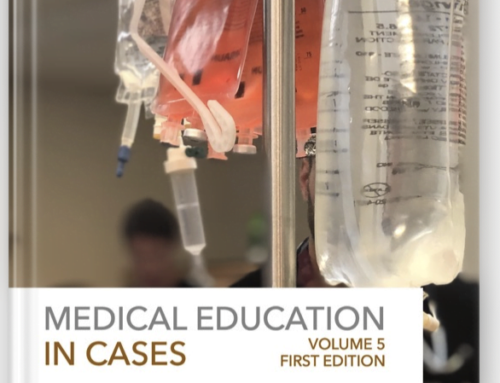 Welcome to season 4, episode 5 of the ALiEM Medical Education in Cases (MEdIC) series! Our team (Drs. Tamara McColl, Teresa Chan, John Eicken, Sarah Luckett-Gatopoulos, Eve Purdy, Alkarim Velji and Brent Thoma) is pleased to welcome you to our online community of practice where we discuss the practice of academic medicine!
Welcome to season 4, episode 5 of the ALiEM Medical Education in Cases (MEdIC) series! Our team (Drs. Tamara McColl, Teresa Chan, John Eicken, Sarah Luckett-Gatopoulos, Eve Purdy, Alkarim Velji and Brent Thoma) is pleased to welcome you to our online community of practice where we discuss the practice of academic medicine!
This month, we present a case of a new emergency attending who feels like she has lost control of her department while working with an overconfident senior resident.
MEdIC: The Case of Shifting Expectations
By Dr. Teresa Chan
Deborah had started as a new attending at St. Elsewhere Hospital and had initially found it difficult to transition to the new environment. The computer system was different from the one she had trained on, the layout of the department was new, it was busier with more patients and more consultants and although the people seemed nice, they were strangers. After three weeks, however, she was finally starting to hit her stride.
Deb was finding her shift especially difficult today.
Deb had been assigned a senior resident for the first time. Supervising Donald was turning out to be a lot more difficult than she had expected.
During her training, Deb had been interested in learning to teach on shift. She had even set up teaching shifts in her final year of residency, hoping to perfect her skills. But in all of her shifts, she had only ever supervised junior residents at least two years behind her in training.
Donald was a confident senior resident, to put it mildly. At her faculty orientation, Deb had been given a primer on all the residents in the program, and she recalled the program director’s description of him, “Donald is… confident. He sometimes borders on cocky, but he’s performed well on the shelf exams and he does a lot of moonlighting, so he has racked up a lot of experience.”
Deb had felt undermined throughout her whole shift. The nurses had looked to Donald for instruction, and had even overridden some of her orders based on his suggestions during a cardiac arrest case. Fortunately, everything had turned out well for the patient, and he was now safely in the intensive care unit (ICU). Still, Deb had noticed that Donald had discharged home a few patients without even telling her, and had forgotten to order a second set of cardiac enzymes in one of his low risk chest pain patients. Deb had asked Donald to call the patient back; luck would have it that he was still in his car in the parking garage and happily obliged.
It was now nearly a half-hour to the end of their shift together, and Deb was feeling very uneasy about how things were going. She had asked Donald a few times to “run the board” with her and update her about his patient-care decisions. Inevitably, they had been interrupted every time they tried to complete this exercise and Deb was feeling like she had lost all control of the department. It was challenging to second the bulk of the patient care to someone else. Adding to that challenge, Donald was intent on making sure that he was “running a tight ship” and insisted that Deb just “sit back and relax” like the other attendings usually do.
“Oh, hey Debbie! How are things?” asked Josephine as she strolled into the department, coffee in hand. Josephine was Deb’s relief, and at this point she was a sight for sore eyes. Josephine also happened to be Deb’s assigned faculty mentor, and they had met a few times recently to discuss how she was settling in to the new department.
Deb looked quickly around the room to make sure she and Josephine were alone.
“Um, it’s been a rough shift,” she whispered.
“Oh?” inquired Josephine with her eyebrows raised. “How so?”
“Well, to be honest, I’m not used to working with senior residents, and I feel like I’ve sort of lost control of the department,” she admitted sheepishly.
Josephine nodded sagely, taking a sip of her coffee. She remembered how she had felt when she had first started. As a new attending, it had been hard enough to finally start thinking independently, but supervising senior residents added a whole other layer of complexity.
Josephine pondered. What advice could she give Deborah to help her in her current situation?
Discussion Questions
For Residents:
- How does working with junior faculty members differ from working with senior faculty members?
- Can you identify things that junior faculty members have done well when supervising you?
- How do you provide feedback to someone who is senior to you? (i.e. How do you tell a faculty member that you appreciated something that they did when they were supervising you? How do you tell a faculty member when they did something that made you uncomfortable?)
For Junior Clinician Educators:
- Have you had any difficult situations while teaching senior residents? If so, what have been some problems have you encountered?
- What advice have you received from senior educators about handling senior residents?
For Senior Educators:
- If you were Josephine, what advice would you give Deborah?
- Are there any unique approaches that you use with senior residents that are different ones you use when you teach junior ones?
- What are some systems that you use to mitigate transitional problems like the ones highlighted in this case?
Weekly Wrap Up
As always, we will post the expert responses and a curated commentary derived from the community responses 2 weeks after the case is published.
This month, our 2 experts are:
- Dr. Warren Cheung
- Dr. Kimo Takayesu
On March 10, 2017 we will post the curated commentary and expert responses to this case! After that date, you may continue to comment below, but your commentary will no longer be integrated into the curated commentary. That said, we’d love to hear from you, so please comment below!
All characters in this case are fictitious. Any resemblance to real persons, living or dead, is purely coincidental. Also, as always, we will generate a curated community commentary based on your participation below and on Twitter. We will try to attribute names, but if you choose to comment anonymously, you will be referred to as your pseudonym in our writing.
Inspired by the Harvard Business Review Cases and initially led by Dr. Teresa Chan (@TChanMD) and Dr. Brent Thoma (@Brent_Thoma), the Medical Education In Cases (MEdIC) series puts difficult medical education cases under a microscope. On the last Friday of the month, we pose a challenging hypothetical dilemma, moderate a discussion on potential approaches, and recruit medical education experts to provide “Gold Standard” responses. Cases and responses are made available for download in PDF format – feel free to use them! If you’re a medical educator with a pedagogical problem, we would love for you to get involved in the MEdIC series! Send us your most difficult dilemmas (guidelines) and help the rest of us bring our teaching to the next level.




